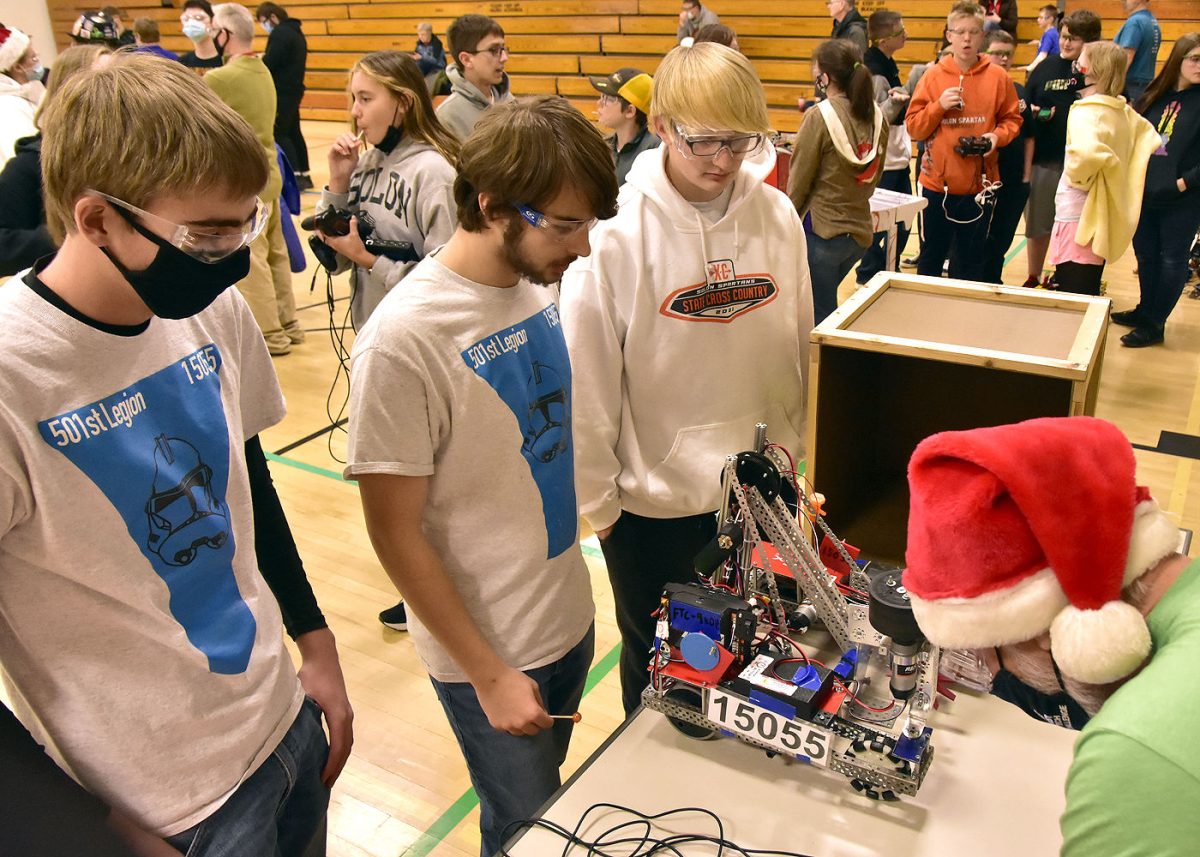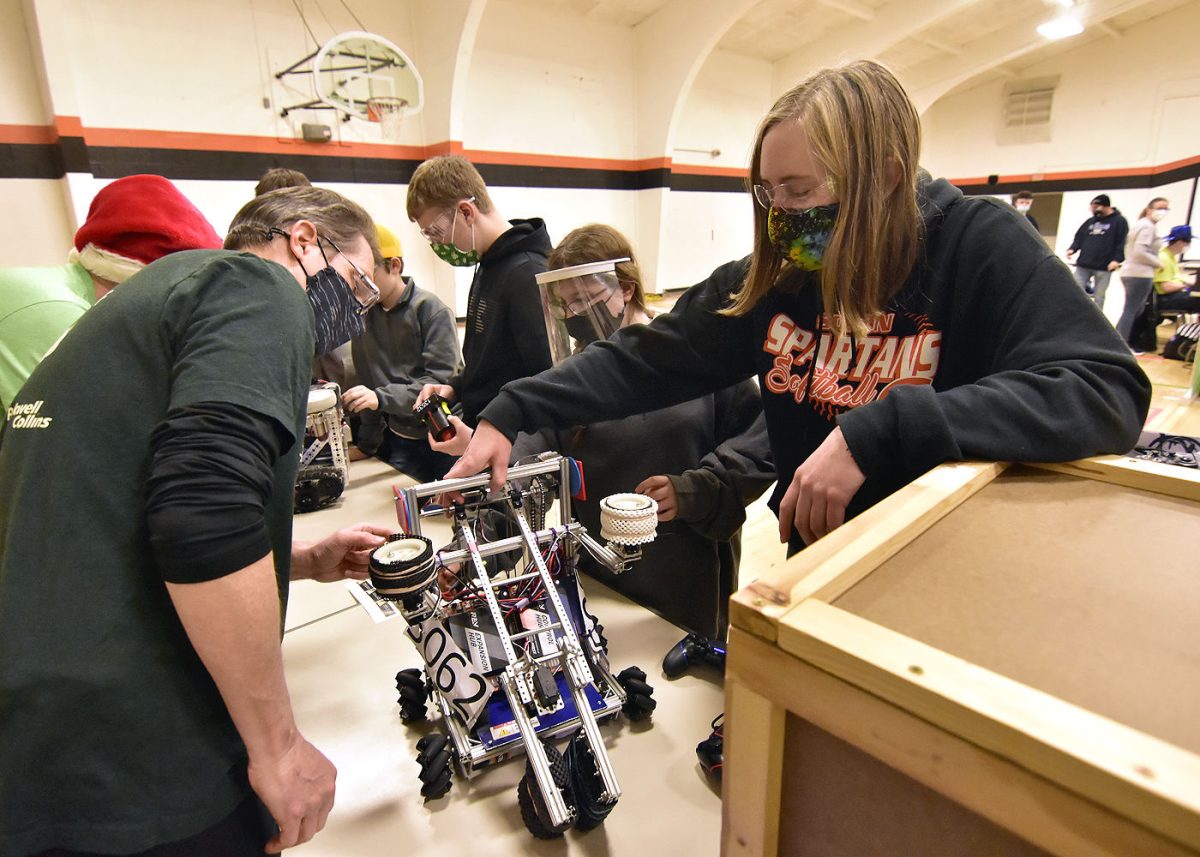Small motors hummed and tiny servos whirred as a four-wheeled metal machine inched closer to its target, a small cube. Swiftly and smoothly the machine scooped up its prize and drove off to a trio of round platforms raised up a couple of feet off of the floor. A mechanical arm raised the cube and deposited it upon the platform much smaller in diameter than the bottom-most.
A few feet away, another machine positioned a small rubber duck as a rotating drum caused a wheel the duck was sitting on to spin.
The preceding was a glimpse into a robotics tournament held Tuesday, Dec. 21, at the Solon Community Center.
16 teams of high school students, including Solon, put the little machines through paces in an effort to score points and advance in the standings ahead of larger competitions, starting next month, with hopes of being one of 48 teams in the State Tournament Friday, Feb. 5, at the Xtreme Arena, in Coralville.
In the prep room, Solon High School juniors Brody Cash, Ryan Bilskie and Ian Ressler put the final touches on their machine, officially known as 15055, “Ed” to them.
“It’s taken us a couple of months to get it to this point,” Brody said. “It’s come a long way, especially since our first tournament.”
The trio designed, built and programed Ed, making revisions based on issues found during competitions. Brody started in robotics in seventh grade and did it through his freshman year, the pandemic wiped out his sophomore year. Ryan is in his seventh year while Ian is in his sixth year.
“I want to work on machines, and I thought robotics would teach me that, and it very much has. This got me started in the engineering process so I can help fix stuff and learn about different mechanical processes,” said Brody.
Ryan said, “I want to be in farming and to be able to fix my own equipment. Robotics has certainly helped; I can fix some of the equipment on the family farm.”
Coach Matt Aliano of Solon’s program said, “We are part of First Tech Challenge (FTC), which is part of firstinspires.org. They do Junior Lego League, Lego League, FTC, and First Robotics Challenge. We do FTC because it fits really well with our school, we can incorporate it into what they’re learning with Project Lead the Way, and it’s worked out really well. I started doing this when my oldest son was a freshman, and the teacher (who was also a coach) was going through a personal issue and didn’t have the time for it. There were three students, and I got talked into having a set of keys, and next thing I know, I’ve been doing it for 11 years.”
The competition is held on a 12’ x 12’ field made of foam tiles with four robots participating at a time.
“It’s an alliance of two robots versus two robots (two red, two blue),” Matt explained. “Matches are randomly selected, and a team could compete against an alliance partner in a subsequent match.”
29 teams are in Solon’s league with 16 represented during the Dec. 21 meet.
Under FTC’s program a team’s advancement to a higher level is based on more than just points scored in competition.
“It’s based on awards, community outreach, engineering notebooks, how well they interview with team judges,” Matt said. FTC does a great job of emphasizing teams going out into the community and focusing on scholastics, he said. “This is what you should be learning, and you should be helping other teams along because you get to be a better team by helping other teams that are competing against you.”
Students in FTC design their own robots and build them with almost anything they can buy or fabricate. 3-D printing is allowed, as is milling and forming metal parts. They are limited to a select group of motors and sensors to choose from but otherwise participants are free to buy parts off of the internet or purchase a kit or make their own from scratch. When completed the robots are a $1200-$1500 investment. To have a machine competitive at the World Championship level is around a $2500 investment, he said.
“So,” Matt said, “they’re expensive but they’re not out of reach.”
Approximately 30 Solon students participate in robotics annually with about half (sixth and seventh graders) doing VEX, a slightly different program aligned with Project Lead the Way while eighth grade-through-seniors are in FTC.
“I have just been a volunteer to do this and to help with state tournaments, and other tournaments wherever it’s needed,” Matt added. “I’ve had a few students who graduated out of the program and gone on to engineering in college. They’ve gone all over the place, and they come back to volunteer.”
A group of parents also volunteer to help, and he said their contributions to the program have been tremendous.
“The coaches (from the other teams) do a great job when we’re short of help, they jump right in, they’re more than willing to help us get things up and running. The teams are very competitive, but they’re also very cooperative. They’re more than willing to help other teams.”
If a rookie team has a computer programming problem. “Another team will jump right in and explain it to them, and not just do it, but will walk them through it so they know what’s going on. That’s the best part of it.”
Solon’s Sophia Miles is a freshman in her second year with FTC after participating in VEX for three years.
“I came here in the middle of my fifth-grade year and many of my friends were doing robotics, so I thought, why not? And I just fell in love with it. I like the coding, that’s the part that I do– the programming, the coding, I love working with that.”
Coding, she explained, is used in many career fields today. She recently completed a coding class with an eye toward a career as a computer programmer.
“It’s a pretty broad spectrum, so I’ll have to think about it some more.”
“I like working through problems with the code, seeing it work out in the field, that’s always really satisfying to see.”
Rebecca Whitaker, Program Delivery Partner for First Tech Challenge for Iowa and Nebraska, oversaw the event and secures fundings for teams, including writing grant applications. She also recruits new teams, organizes events, such as the meet in Solon, trains volunteers and coaches and performs administrative tasks for the 171 teams in Iowa. The teams come from school districts, non-profit organizations, Boy Scout troops and Girl Scout troops, formed into seven leagues.
Rebecca, who works at the University of Iowa’s College of Engineering said, “We see this as a great opportunity to recruit students into the College of Engineering, but also most importantly, to get them exposed to the STEM (Science, Technology, Engineering, and Math) fields. That way, they are aware of the different opportunities they can do as a career.”
The College of Engineering brought robotics programs to Iowa in 2009 in partnership with Rockwell Collins, and Rebecca, as the K-12 outreach coordinator, was tasked with implementation.
“I’ve been very fortunate to work with a lot of fantastic teams, a lot of fantastic volunteers, and a lot of them become a second family. My kids have been exposed to this since they were a year old, and I’ve seen a lot of kids go through the program, graduate high school, graduate college, get married, get careers, have children, so it’s been really great.”
When asked what advice she would give to somebody pondering entering the world of robotics, Sophia said, “I’d say do it. It’s a lot of fun, try it out for yourself and you’ll definitely enjoy it.”
If you have a child who would be interested in exploring robotics, email Rebecca Whitaker at [email protected] or reach out to the school district to contact the coordinator.
“We will start to recruit new teams in May and get them ready for the new season in September.”
As for Brody, Ryan, Ian and Ed the Robot, Ed was undefeated at 6-0 for the day.
Abby Kramer explains a feature on the robot owned and operated by her, Haeley Ball (at left) and Sophia Miles during inspection prior to competition Tuesday, Dec. 21, at the Solon Community Center.


